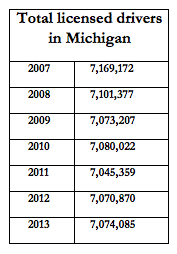By BECKY McKENDRY
Capital News Service
LANSING- The Millennial Generation is shying away from the driver’s seat, according to a new report.

In addition to driving fewer miles per person, the number of licensed drivers in Michigan is on an overall downward trend, although the number is slightly higher this year than in 2012. Source: Michigan Department of State.
“Moving Off The Road,” published by the nonprofit Public Interest Research Group, suggests working from home, economic factors and urban population contributed to less driving nationwide.
In 2013, Michigan drivers traveled almost 6.7 percent fewer miles than in 2005 and 7.6 percent fewer miles than in 2007, the peak driving year. Those in their late teens to early 30s strongly lead the trend.
And as the trend is expected to continue, many Millennials are transporting themselves in different ways.
In Detroit, for example, many college students embrace alternative transportation options.
“Wayne State is a commuter campus, and still I see more and more students riding bicycles, using the campus shuttle and our car-sharing program,” said Daryl Pierson, the sustainability coordinator at Wayne State University.
Other transit initiatives include the popular Campus Alternative Transportation Map – a comprehensive map illustrating everything from walking paths to bus routes – and a social media ride-sharing program.
Pierson says that efforts to “go green” and save money, technology and social media are partly responsible for the trend.
“Social media means that kids don’t need to travel to interact with each other,” he said. “When I was younger, it used to be a real sense of pride to own a muscle car. Now the status symbol is your phone.”
Metro Detroit residents can take advantage of similar ride-sharing programs, like MIRideShare and MIBikeShare.
“Gas prices will probably continue to rise,” said Grant Brooks of MIRideShare and MIBikeShare. “And I think more and more people will reach their breaking points and start trying to find different ways to get to work.”
Brooks says he expects the two programs, which match prospective carpoolers and biking partners in Metro Detroit, to continue to gain popularity. Between 7,000 and 8,000 residents currently participate in the carpooling program.
Still, he says, more offerings are necessary.
“Michigan kind of lags behind the rest of the country in terms of alternative transportation,” he said. “People are attached to their cars.”
Addressing public transit needs is long overdue, says Megan Owens, executive director of the nonprofit Transportation Riders United in Detroit.
“There’s a lot of frustration from younger people who either are paying off student loans or are trying to launch careers on internship salaries,” she said. “They’d like to be able to get around in the public transit system but it’s not reliable enough and it doesn’t run late enough.”
Owens says she looks forward to upcoming projects like the M1 rail line, but the Detroit area desperately needs more rapid transit like commuter trains and to improve existing bus lines to attract young professionals.
Competitive public transit is an absolute necessity, she said.
“It’s about the vibrant, urban lifestyle that public transit represents and enables,” she said. “This generation grew up on ‘Sex and the City’ and ‘Friends’ and they want that urban lifestyle depicted without driving everywhere.”
Appreciation for that lifestyle also is being cultivated among some of the area’s younger residents.
For example, Detroit nonprofit Back Alley Bikes teaches bike repair to 10- to 17-year-olds, as well as offering “bike earning” programs and riding events. Program director Jason Fiedler says immersion in bike culture allows the younger generation to view transportation in a new light and choose bikes more than cars, when distance and weather permit.
“People used to see bikes as a toy to give up as they enter adulthood, but now more younger people see it as a reliable method of transportation,” he said.
Fiedler says that although he works with young people who still look forward to their driving tests and their first cars, he has noticed many appreciate bikes rather than cars.
“They learn how to fix their bike, repair costs are less and it’s much more accessible,” he said. “We show the younger folks before they get behind the wheel of a car – bikes are a reliable method of transport.”
And as more embrace the idea, more follow.
“People aren’t willing to partake” in alternate transportation “until they see other people doing it,” he said. “But once you see a group biking to work, it makes you feel safe to do the same.”